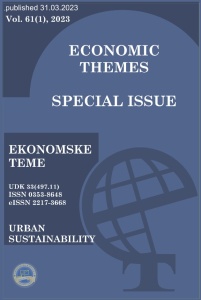Economic Themes (2023) 61 (1) 1, 1-18
Dušan Teodorović, Miloš Nikolić
Abstract: A significant part of highway and street congestion is produced by work zones. Depending on the type of construction and/or rehabilitation activity, street capacity could be significantly decreased, or the street could be completely closed. The work zone generates traffic delays in the street where maintenance is performed. Additionally, the work zone generates additional traffic on the neighboring streets, since many drivers change their routes. There are numerous possible work zone schedules. The total travel time of all network users highly depends on the chosen work zones schedule. Work zones scheduling problem has a natural nested structure that requires to be modeled as a bi-level problem. We considered the bi-level work zones scheduling problem. The objective function in the upper level, which we try to minimize, represents the total travel time of all network users. Relations in the lower level, help us to compute User Equilibrium flows. The proposed solution to the problem is based on the combination of Integer Programming and a heuristic traffic assignment algorithm. The output of the developed model consists of the start time of each work zone. The Sioux Falls benchmark network is used to illustrate the proposed procedures and the achieved performances.
Keywords: Work Zones; Traffic Assignment; Combinatorial Optimization; Incremental algorithm
WORK ZONE SCHEDULING PROBLEM IN THE URBAN TRAFFIC NETWORKS
Dušan Teodorović, Miloš Nikolić
Abstract: A significant part of highway and street congestion is produced by work zones. Depending on the type of construction and/or rehabilitation activity, street capacity could be significantly decreased, or the street could be completely closed. The work zone generates traffic delays in the street where maintenance is performed. Additionally, the work zone generates additional traffic on the neighboring streets, since many drivers change their routes. There are numerous possible work zone schedules. The total travel time of all network users highly depends on the chosen work zones schedule. Work zones scheduling problem has a natural nested structure that requires to be modeled as a bi-level problem. We considered the bi-level work zones scheduling problem. The objective function in the upper level, which we try to minimize, represents the total travel time of all network users. Relations in the lower level, help us to compute User Equilibrium flows. The proposed solution to the problem is based on the combination of Integer Programming and a heuristic traffic assignment algorithm. The output of the developed model consists of the start time of each work zone. The Sioux Falls benchmark network is used to illustrate the proposed procedures and the achieved performances.
Keywords: Work Zones; Traffic Assignment; Combinatorial Optimization; Incremental algorithm

